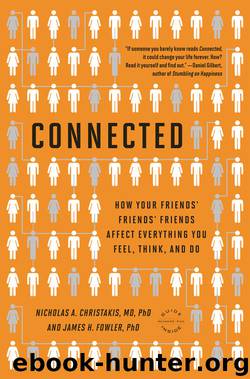Connected: The Surprising Power of Our Social Networks and How They Shape Our Lives by Nicholas A. Christakis & James H. Fowler

Author:Nicholas A. Christakis & James H. Fowler [Christakis, Nicholas A.]
Language: eng
Format: azw3
Tags: SOC000000
ISBN: 9780316071345
Publisher: Little, Brown and Company
Published: 2009-09-08T16:00:00+00:00
Your Vote Doesn’t Count
Many people—whether Republican, Democrat, or Independent—felt inspired by their participation in the 2008 campaign. And many more encouraged their friends and families to vote because “it’s the right thing to do.” But this behavior is somewhat puzzling. Although adults in most democratic countries have the right to vote, each of these votes is just one of millions of others. Politicians frequently tell their supporters “every vote counts,” and people usually say they vote in order to help their candidate win. But under what circumstances will a vote actually do that? This basic question has led to a series of investigations by brilliant social scientists, each building on the work of previous thinkers, but all leading, alas, to the same conclusion. Rationally speaking, each vote doesn’t count. The reason we vote, it turns out, has a lot to do with our embeddedness in groups and with the power of our social networks.
In 1956, Anthony Downs, an economics graduate student at Stanford, decided to apply the science of “rationality” to the study of politics.2 He did not mean this as an oxymoron. The word rationality takes on a very specific meaning here, and it is not the opposite of crazy. Rationality means three simple things. First, rational people have preferences and know them. So you prefer an orange to an apple, a dollar to a penny, or a Democrat to a Republican. Or you may be indifferent. The point is that you can compare two things, and you know which one you like better or you know you like or dislike them equally. Second, rational people’s choices are consistent. If you would rather have the orange instead of the apple, and the apple instead of the pear, then you will not choose the pear over the orange. Consistency is analogous to transitivity in algebra: if A > B and B > C, then it must be true that A > C. And third, rational people are goal oriented. Once we know what we want, we try to get it.
Downs wanted to see whether voting could be understood as rational and, if so, under what circumstances. He noticed that politics in the United States was often about two choices, not more. Vote for the Democrat or the Republican. Lower taxes or raise them. Veto the bill or sign it. In fact, our government is replete with formal procedures that reduce a wide range of choices to just two. Downs assumed that voters would focus on one of the alternatives (say Barack Obama) and think carefully about everything that would happen if this alternative were chosen. They would then assign a value to this outcome that described the benefit. In other words, they would try to answer the question, how useful would an Obama presidency be to me personally? Next they would think carefully about the other alternative (say John McCain) and assign a value to that future outcome. Each voter would then vote for the alternative that yielded the greater value for themselves.
Download
This site does not store any files on its server. We only index and link to content provided by other sites. Please contact the content providers to delete copyright contents if any and email us, we'll remove relevant links or contents immediately.
| Circuits | Digital Design |
| Electric Machinery & Motors | Electronics |
| Fiber Optics | Networks |
| Superconductivity |
Whiskies Galore by Ian Buxton(40302)
Introduction to Aircraft Design (Cambridge Aerospace Series) by John P. Fielding(32332)
Small Unmanned Fixed-wing Aircraft Design by Andrew J. Keane Andras Sobester James P. Scanlan & András Sóbester & James P. Scanlan(32137)
Craft Beer for the Homebrewer by Michael Agnew(17440)
Turbulence by E. J. Noyes(7033)
The Complete Stick Figure Physics Tutorials by Allen Sarah(6632)
Kaplan MCAT General Chemistry Review by Kaplan(6045)
The Thirst by Nesbo Jo(5779)
Bad Blood by John Carreyrou(5763)
Learning SQL by Alan Beaulieu(5400)
Weapons of Math Destruction by Cathy O'Neil(5032)
Man-made Catastrophes and Risk Information Concealment by Dmitry Chernov & Didier Sornette(4729)
iGen by Jean M. Twenge(4695)
Digital Minimalism by Cal Newport;(4512)
Life 3.0: Being Human in the Age of Artificial Intelligence by Tegmark Max(4495)
Audition by Ryu Murakami(4092)
1,001 ASVAB Practice Questions For Dummies by Powers Rod(4034)
Electronic Devices & Circuits by Jacob Millman & Christos C. Halkias(4021)
Pale Blue Dot by Carl Sagan(3997)
